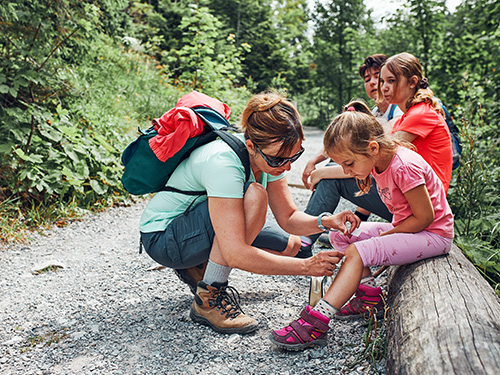(Posted 2025 July)
 Summer is here, school is out, and it’s time for family fun! To make the most of this season, parents and caregivers can plan ahead, be mindful of risks, and do what you can to minimize them. To help you, our Parenting Education Programs staff has compiled some safety tips for keeping your family healthy and happy while enjoying summer adventures and downtime.
Summer is here, school is out, and it’s time for family fun! To make the most of this season, parents and caregivers can plan ahead, be mindful of risks, and do what you can to minimize them. To help you, our Parenting Education Programs staff has compiled some safety tips for keeping your family healthy and happy while enjoying summer adventures and downtime.
Spending time outdoors is a great way for everyone to stay active and enjoy nature. However, it's important to take precautions to keep yourself and your family safe. Here are some tips:
- Drink water: Staying hydrated is key, especially during sports or long outings. Make sure to have water bottles on hand and encourage everyone to drink plenty of water throughout the day to replenish lost fluids.
- Wear sunscreen: Protect your skin from harmful UV rays by applying sunscreen with at least SPF 30. Reapply every two hours, even on cloudy days.
- Use safety gear: Helmets and pads should always be worn when biking, skateboarding, or rollerblading to prevent concussions and other injuries.
- Wear highly visible swimsuits: Swimmers should wear bright colors like neon yellow, orange, or pink. This makes it easier to see them in the water, especially in busy pools.
- Set curfews for teens: If your teen is out with friends, set curfews or check-in times. Knowing when and where they’re expected to be will help you respond quickly in case of an emergency.
 Screens are an ever-present part of our lives, and in the summer, children and teens have even more time to get lost in the online world. Phones provide a constant connection which can impact children’s developing minds in ways we don’t fully understand. Parents should be alert to personality changes, set proper limits for online usage, and set a good example of digital responsibility:
Screens are an ever-present part of our lives, and in the summer, children and teens have even more time to get lost in the online world. Phones provide a constant connection which can impact children’s developing minds in ways we don’t fully understand. Parents should be alert to personality changes, set proper limits for online usage, and set a good example of digital responsibility:
- Think before posting: Remind kids not to share personal information, like where they live or go to school or plans for a vacation, on social media or while online gaming.
- Talk about online behavior: Discuss how to handle unwanted messages or cyberbullying. Teach kids and teens to deal with gaming chats and social media interactions with confidence.
- Limit screen time: Set rules to make sure there’s a good balance between spending time online and offline. Encourage more outdoor play, family time, and non-digital activities.
More time with peers means more time navigating social situations. It’s important to prepare children and teens for a variety of situations they might face:
- Talk openly: Create a home where kids feel comfortable sharing what’s on their minds. Encourage them to talk about uncomfortable situations, peer pressure, or even small concerns so they know they can always come to you for help.
- Practice saying no: Help kids role-play different scenarios where they might feel pressured to join activities that make them uncomfortable.
- Stick together: Encourage kids to use the buddy system when they’re at parks, events, or out in the evening. Staying in pairs or groups is safer, and bright clothing can make them more visible.
 Being prepared for emergencies is crucial for every family. These steps can help children and adults feel confident in handling unexpected situations:
Being prepared for emergencies is crucial for every family. These steps can help children and adults feel confident in handling unexpected situations:
- Learn basic first aid: Teach kids simple skills, like how to clean cuts, treat burns, and recognize signs of heat exhaustion. Older kids and teens can attend first aid or CPR classes at local community centers or the Red Cross.
- Memorize phone numbers: Make sure children know important phone numbers by heart, like a parent’s or guardian’s cell phone number and a trusted adult’s contact information. Younger children can carry them on a card in their backpack, while teens should add them to their phones under clear labels, like "Emergency" or "Mom."
- Recognize heat exhaustion signs: Look out for heavy sweating, dizziness, nausea, or pale skin. If you see these signs:
- Move to a cooler place.
- Loosen clothes and apply cool, damp cloths to their skin.
- Offer small sips of water.
- Seek medical help if symptoms last longer than an hour or worsen.
Being safe this summer begins with small steps. Have conversations with your kids, set rules, and teach them ways to handle challenges. With a little effort, you can help your family stay safe, healthy, and prepared for anything.
For more practical parenting advice like this, the Parenting Education Programs welcomes you to register for our upcoming fall classes or parent cafés. Join us for more information about positive and effective ways parents can interact with their children at every age and stage of development.

